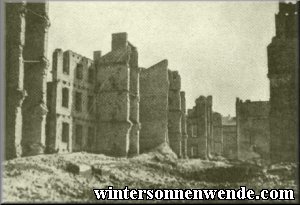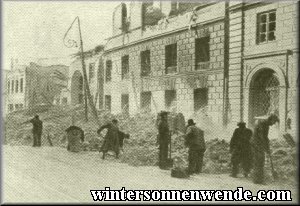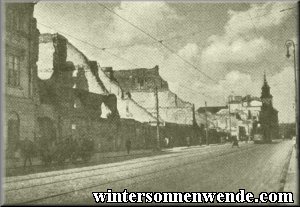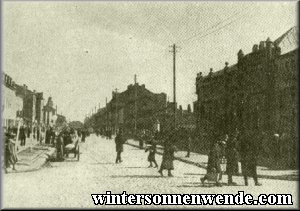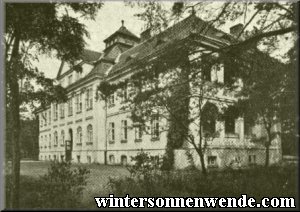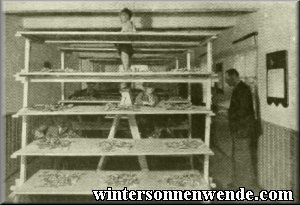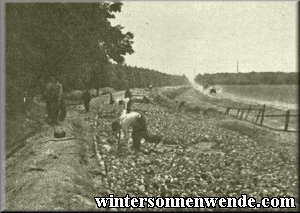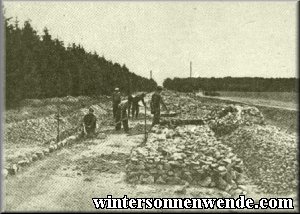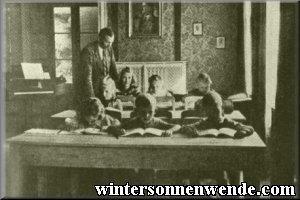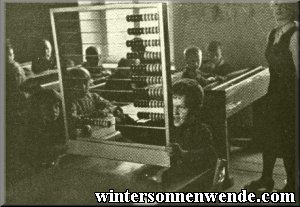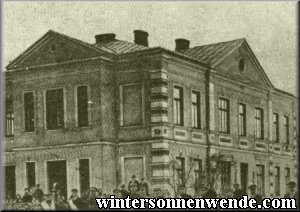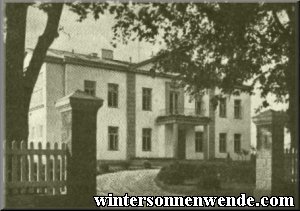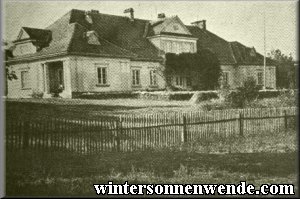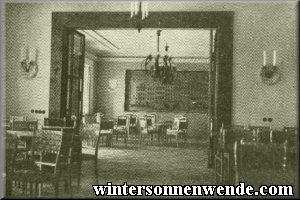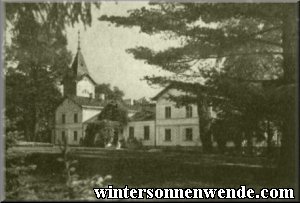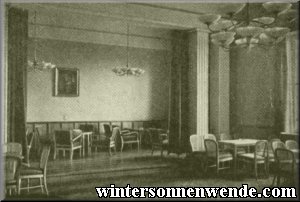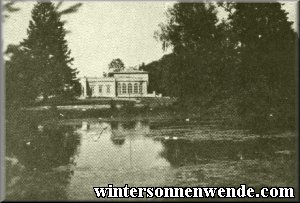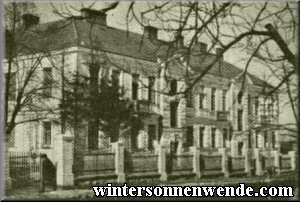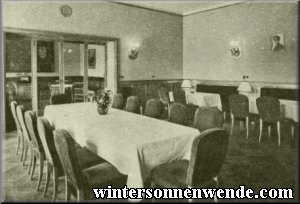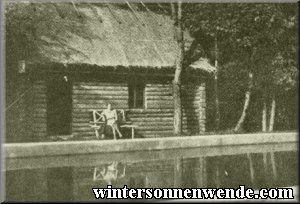 |
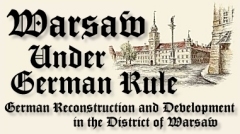 Administrative Reconstruction and Development in Warsaw District (Part 3)
6. Duties of the County and City Administrators
On several occasions, graves of murdered ethnic Germans were located in the District of Warsaw, and the search for the perpetrators was begun. Particularly in county precinct Lowitsch – to which great numbers of ethnic Germans had been abducted, and where some of them had been freed by the advancing German Wehrmacht – numerous brutally butchered Germans were exhumed and transported to their homeland.
In these early days, the activities of the County Administrators were aimed at restoring the public administrative systems to working order. Some of the former Polish officials and staff could be brought back into service for a wide range of functions; beyond that, vacancies were filled by new appointments. In a number of cases, new mayors and community bailiffs had to be appointed, and qualified ethnic Germans were chosen for these positions wherever possible. In those instances where files and other papers had been misappropriated during the war, it was necessary to recreate this bureaucratic documentation from the ground up. Particularly in taxation offices and local and savings banks, the contents of financial books that had gone missing had to be reconstructed as far as possible based on other papers and the findings of additional investigations. The flow of public finance was soon restored, ensuring the prerequisite for the further work of the authorities, particularly the municipal and local administrations. In a few county precincts it was even possible to set up tentative budgets for the remainder of 1939–40. For the first few weeks, supplying the populace with food and other everyday necessities posed a special challenge to the County Administrators. Even at that early stage, some Administrators had already introduced and enforced the compulsory turning-in of grain and other foodstuffs to provisional collection stations to prevent famine and the associated public unrest. After a few weeks, the danger was past. After the most pressing work pertaining to the normalization of living conditions and restoration of public order had been completed, a proper administrative development and the systematic resolving of the challenges posed to public administration could be begun. Naturally, the County Administrators devoted special attention to the ethnic Germans residing in their precincts. A special action of the National Socialist public welfare organization (NSV) alleviated the Germans' greatest misery. They were issued identification cards and given all possible assistance. In the course of the elimination of Jewish influence, numerous shops and retail businesses could be assigned to them. In the open countryside, damage resulting from the war or from Polish terrorist activities was compensated for as much as possible. Needy peasants, for example, were granted horses, carts and harness free of charge; in some cases the rebuilding of destroyed farmsteads was made possible. The Germans were given priority in the provision of food, coal, clothing and footwear as well as of artificial fertilizer and high-quality seed to improve agricultural output. The difficult farm situation resulting from the repeated levying of horses for the war was relieved by a special compensation program. Needy ethnic Germans, as well as the families of the conscripted, were given regular aid, and mothers in need of a rest were sent with their children to the Convalescent Home for Mothers in Rabka. The German registry offices opened in spring of 1940 and have since worked on documenting the region's demographics. Findings to date reveal a rather favorable birth/death ratio. The ethnic Germans living in the eastern parts of the District were resettled into the Reich proper in the course of 1940, and the County Administrators rendered active and able assistance to the Resettlement Commissions in the very extensive work involved. Alleviating the ethnic Germans' poverty was a problem of utmost importance, and thorough preparations for a solution are still ongoing. The at times quite difficult economic conditions under which many ethnic Germans still suffer are an unfortunate consequence of the fragmentation of farm landholdings, especially through the practice of property inheritance sharing. The Germans in particular have suffered from these conditions, as many of them have been most reluctant to leave their home villages for a completely alien environment. In German villages there are frequently landholdings of only a few acres which barely produce enough to live on. Welfare measures taken by the County Administrators have done much to relieve the situation, but have not sufficed to completely eliminate the poverty and want. Drastic improvement will not be possible until reapportioning of the land has increased the productive land area to a degree where it will yield an adequate living. The Jews posed particularly difficult problems for the County Administrators. Before the war, a disproportionate number of Jews lived in all of the larger towns and cities of the District as well as in the smaller trading centers. In some places they made up 50% or even more of the total population and dominated trade as well as large sectors of the economy, and by the end of the war their numbers had seen a further marked increase due to emigration and resettlement from the Reich's new eastern territories. The County Administrators and their penal institutions fought energetically against the Jewish practices of black-marketeering and usury. In the autumn of 1939, trustees were appointed for five large Jewish industrial plants and factories. Then a stop was put to the activities of the Jews in the wholesale trade of grain, foodstuffs of all kinds, and livestock; further, the systematic Aryanization of stores and retail businesses was begun. Above all, in accordance with the orders issued, the Jews were dislodged from the leather, textile and fur trade, and the stock in store was assumed by the new proprietors. In many cases, energetic investigations by the gendarmerie found that the Jews had hidden, bricked in or buried extensive caches of goods; tough measures were taken in such instances. The incredible uncleanliness of the Jews living in very crowded conditions resulted in the outbreak of typhus fever in many towns in the District. The efforts to control this epidemic revealed the Jews to be a hotbed of disease whose lice-ridden filthiness rendered them a public health hazard. To prevent further danger posed to public health by the Jews, closed Jewish living quarters were set up in a good number of communities within the District. With that, the Jews have largely disappeared from the cityscape of the District and are kept under appropriately strict supervision. In the spring of 1941, the Jews that had lived in the western areas of the District were assimilated into the Jewish quarter1 set up in Warsaw. As a result, the western regions of the District have been free of Jews since that time. In order to give those Jews who were able to work something useful to do, they were assigned to forced labor in accordance with an order issued by the Governor-General. Specifically, they were enlisted for the melioration and regulation of the water supply, for road construction work, road sanitation, for clearing the streets of snow and ice, and for demolition work in the destroyed cities. However, it has become quite clear that the Jews are generally incapable of performing even the slightest physical labor in an efficient and economically effective manner. On the whole, the productivity of a Polish laborer is far greater than that of a Jew. Precautionary measures were taken by the Health Department to preclude the danger of epidemic posed throughout the District by the Jews. At the same time, these measures were intended to improve the general population's exceptionally poor state of health, which had rendered many of them unable to work.
These measures have taken on a special significance in the context of the Eastern Campaign against Soviet Russia. They have ensured that the territory behind the troops, which is of utmost importance for supplies to the front and for the care of the wounded, will remain free of disease and cannot harbor any threat to the health of the soldiers at the front. These health care measures have been most successful. The County Administrators have devoted special attention to matters of food supply. An instructional campaign regarding the proper cultivation of fields, the use of artificial fertilizer and improved seed, the use of agricultural machinery, effective farm management and numerous other techniques was necessary to increase agricultural production. For large landholdings, in-depth cultivation plans were drawn up which the landowners must carry out. Landowners were often called to meetings where they were given directions and recommendations for the working of their farms. The implementation of cultivation, plans and instructions were kept under constant supervision by the respective county agriculturalists and the regional agriculturalists assigned to them. Poorly managed farms were confiscated and transferred to the State Land Administration.
The county precinct Departments of Food and Agriculture have also taken some significant measures for the promotion of stock breeding. For example, quality breeding cattle were brought in from the Reich and sold to the landowners and farmers. Measures for the improvement of water distribution and supply were carried out in the county precincts by hydroeconomic inspectors. Their efforts towards the regulation of rivers and streams and the draining of land with too high a water table are given constant support by the County Administrators. The work of the hydroeconomic inspectors constitutes a significant contribution to the overall achievement of the County Administrators. By virtue of their energetic and enterprising approach and their vigilant supervision of construction sites and the hydroeconomic departments placed in their charge, these inspectors – who are for the most part, the only Germans in their field – have overcome the most difficult of conditions and attained considerable results. To ensure that agricultural produce reaches the consumer in a systematic and controlled manner, these products are collected by the Department of Food and Agriculture, that is, turned in by the peasants to various collection stations. Delivery quotas are assigned to the communities and villages of each county precinct and made known to the farmers by the County Administrators. For turning in their produce, the farmers receive so-called premium coupons2 above and beyond the regular payment; these coupons entitle them to receive textiles, iron, leather goods, petroleum, vodka and the like. Since these items are not simply available for purchase without a coupon, they constitute a powerful incentive for the farmers to deliver their products in accordance with regulations. With this premium coupon procedure, the German administration is in effect using a sort of barter system, and thus following in the footsteps of proven colonial experience. As a rule, the peasants meet their delivery obligations fully and on time. The few who are unwilling are brought into line with punishment and time in a work camp. In villages which are considerably behind in the delivery of their grain because the farmers have not yet threshed, a compulsory threshing is enforced by a special service unit. Having this unit, with its own threshing machine, appear in the village in question usually already suffices to persuade the farmers to begin immediate threshing, which is often even continued overnight. The "Agricultural Branch", with noteworthy assistance by the County Administrators, has set up and occasionally rebuilt warehouses to accommodate the storage of the produce turned in. Further, and again with significant contribution by the county precincts, dairies have been built or restored and modernized. As a result, the total delivery of milk and production of butter is generally increasing. The distribution of food to the people in the quantities to which their food stamps entitle them was carried out on schedule in every county precinct. Even though the supply process suffered numerous interruptions, particularly in the vicinity of the city of Warsaw, it was always possible to remedy the situation again. In terms of the economy, the County Administrators' first responsibility was to restore the extant industrial plants and facilities to working order. The problems of obtaining raw materials made the restoration of the industries extraordinarily difficult; however, it has nevertheless been possible to return most of the factories to a productive state. While some of them later had to shut down temporarily, most of these could resume production after the problem had been eliminated. Jewish-owned industrial establishments were seized. Craftsmen's businesses were also largely able to resume production. Most notably in the cities of Sokolow and Wengrow – which prior to the war had been particularly craft-oriented cities, focusing on the furrier's, shoemaker's and carpenter's trades – the local County Administrator set up extensive workshops, some of which are already satisfying the demand from county precincts above and beyond their own. The county precinct Economic Departments were further responsible for the distribution of essential goods, particularly of textiles, leather, iron goods, coal and the like. In the open countryside, the supply of coal had been a problem of special concern in past winters because the inadequate transportation network hindered uniformly sufficient supply to all areas. For this reason, considerable quantities of peat have been produced wherever possible to alleviate the dearth of fuel. The responsibilities of setting and monitoring prices were also energetically carried out in accordance with the guidelines issued for that purpose. Exceeding maximum prices and other violation of pricing laws were punished with fines. Strong contingents of the gendarmerie and special services units were brought in to combat black-marketeering practices, which were particularly prevalent in the county precincts surrounding the city of Warsaw and which had severely disrupted harvest control measures. Inspections carried out both day and night in railway stations and on the main roads were consistently very successful. Transportation posed special tasks for the County Administrators. Traffic Control Departments set up in their divisions were responsible not only for the registration of vehicles and their assignment to uses best meeting the requirements of wartime, but also for the provision of considerable numbers of horse-drawn carts for manifold purposes. In the open countryside, horse-drawn carts and carriages remain a chief means of transportation which is always reliable especially in winter and on the unimproved country roads. Teams of horses were required for road construction, which was of particularly great significance in the eastern part of the District in the creation of the great state thoroughfares; for the transport of the timber cut by order of the Forestry Supervision Council; and for countless transport tasks for the Wehrmacht during its deployment to the German–Soviet border. During this time especially, the demand for draught teams in the eastern regions of the District was so extraordinarily great that some county precincts had to provide as many as 8,000 teams daily. The County Administrators responsible managed to meet all demands. That spring tilling could be completed at the same time and with only negligible delay, despite this incredible strain on the resources of the peasants, is a most noteworthy achievement. In the field of transportation, the County Administrators in their capacity as traffic policing authority were further responsible for ensuring that all roads of significance were kept cleared of snow and ice during the winter months and were thus passable at all times. There were days during the severe winter of 1941–42 when more than 1,000 people worked at clearing a single stretch of road a few kilometers long of drifts several meters high. Through-traffic, so vitally important to the Eastern front, never once became snowbound.
Besides the supervision of the German school system, the county precinct Inspector of Schools is charged with the supervision of the Polish school system. One or more Polish school inspectors assist him in this capacity. The Polish vocational, business and skilled trades colleges as well as the agricultural colleges have received special support through this function of the County Administrators' authority, since these schools serve to educate and train competent and qualified experts for whom there is always a demand, as well as able farmers. The Employment Centers affiliated with the authority of the County Administrators have been quite successful in attracting farmers and skilled tradesmen from the Reich. They have also regularly helped to place employees with large firms and other enterprises. Their service has contributed much to the proper and on-time completion of the large construction projects initiated by the Wehrmacht, Eastern Rail and the Road Construction Departments. Financial inspectors associated with the offices of the County Administrators supervise the state taxation offices, which are staffed exclusively by Poles. Despite considerable difficulties early on, the financial inspectors have managed to effect the regular collection of taxes due as well as increased collection of overdue taxes, and in doing so have made a significant contribution to the creation of a healthy financial situation within the administration of the General Government.
The Administrators have had to overcome great difficulties in the creation of the common rooms and the renovation and furnishing of the residences. In the Polish cities there are no architects to be found whose designs reflect German tastes, and no craftsmen who are capable of creating furniture or the like in the German style. For this reason many Administrators have had to draw up designs
The County Administrators have also seen to facilities promoting physical exercise and rest and relaxation in the open air and countryside for their workforce. In Sokolow, for example, a swimming pool and a Finnish sauna were built. Sports clubs founded by the County Administrators provide a setting for sports activities. Horseback riding is especially popular. These manifold administrative responsibilities have been carried out in the county precincts of the District in the face of considerable difficulties everywhere, and with only few German employees from the Reich. The outstanding results that have been achieved in spite of the many difficulties were possible only by virtue of the utmost dedication and selfless commitment of the County Administrators and their staff.
 1Cf. Section IV.2: "The Jews in the District of Warsaw". ...back... 2Cf. Section VI.4: "Regulation of Marketing Practices, and Food Distribution". ...back...
3Cf. Section IX: "Housing and Settlement Programs". ...back...
|





